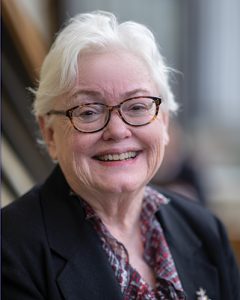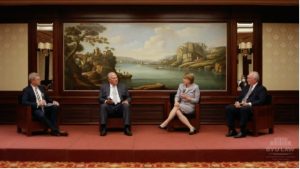 Jane Wise is an Associate Director, International Center for Law and Religion Studies, J. Reuben Clark Law School, Brigham Young University
Jane Wise is an Associate Director, International Center for Law and Religion Studies, J. Reuben Clark Law School, Brigham Young University
The 28th Annual Law and Religion Symposium, sponsored by the International Center for Law and Religion Studies and BYU Law School, was centered on “A Time to Heal: Peace among Cultures; Understanding between Religions.”
Leaders of The Church of Jesus Christ of Latter-day Saints began the 28th Annual Law and Religion Symposium Sunday, October 3, 2021, with a discussion about healing and equal privileges of belief among all people. From a pre-recording at the G20 Interfaith Summit in Bologna, Italy, held in September, panelists included Elder Ronald A. Rasband of the Quorum of the Twelve Apostles, Sister Sharon Eubank, first counselor in the Relief Society general presidency and president of Latter-day Saint Charities, and Elder Jack N. Gerard, a General Authority Seventy. Brett G. Scharffs, a professor at BYU Law School and director of the International Center for Law and Religion Studies, moderated the discussion. This was the second time the symposium was hosted virtually because of the COVID-19 pandemic.
Elder Rasband began the discussion by sharing what he called the “essence” of the Church’s approach to religious liberty—the 11th Article of Faith. It states that “we claim the privilege of worshipping God according to our own dictates and we allow all men that same privilege.”
Elder Rasband said, “We want to be given the opportunity to say and do and feel and speak that which we believe as a church. . . But we are just as anxious to have everyone else have the same privilege.”
The 11th Article of Faith perfectly describes what Scharffs called the “reciprocal nature” of religious freedom, “that it needs to be for all people in all places.”

Sister Eubank then described what the pandemic has taught her. “If everyone isn’t protected, then nobody is protected,” she said. “That’s true in the pandemic, but it’s also true in the issues … about literacy, about health, about infant mortality, about all those difficult issues that are just chronic, and they go along in the world.”
She then explained that the best solutions for these problems will be implemented at a grassroots level, within the family. According to Sister Eubank, that is where the real potential for positive change lies.
Elder Gerard then spoke briefly about that session’s theme. “If you believe all the surveys that are taken, there are fewer people of faith today in the world,” he began. “When we see that trend, we need to coalesce together and make sure we put aside any of our differences and focus on those things that we collectively believe in order to help this healing process.”
That comment began a theme of collaboration and relationship building that continued throughout the discussion.
“Now’s the time to put true religion into practice—from our Christian perspective—to join with our brothers and sisters all over the world, the Muslim world, the Jewish world, whatever it may be,” Elder Gerard said.
Sister Eubank shared her experiences of reaching out to and working with religious leaders of other faiths during the pandemic. Specifically, she talked about collaborating with Suzanne Sahloul, a member of the Syrian community in Michigan, who helps Afghan refugees resettle in the United States.
“It’s about human connection,” Sister Eubank said. She described how building the bridges between faith communities is more than simply professional work.
Elder Rasband then discussed the work the First Presidency does to build strong relationships with world leaders. He went into detail about President Nelson’s recent relationship with the NAACP and the new initiatives that are going to take place as a result. “We have become brothers,” Elder Rasband said as he described the relationship.
The panelists concluded their remarks with comments about a common connection between people of all faiths around the world as children of God.
“We build the relationship, we knock down the barriers, we improve understanding, then we come to know each other for who we truly are, what we feel in our hearts, not as different races, not as different demographics, but truly all children of a Heavenly Father,” Elder Gerard said.
Sister Eubank said, “We are not in this for selfish reasons. We are in this with you because of our love of God.”
Each year, the International Center for Law and Religion Studies hosts this conference and invites speakers and delegates from around the world to discuss matters of religious freedom. These discussions are held between people of all different faiths and backgrounds.
Monday and Tuesday sessions of the Law and Religion Symposium were held beginning with keynote discussions and then moving on to regional breakout sessions where delegates from certain areas discussed more local matters.
Monday, October 4, 2021: “Challenges and Keys to Successful Collaborations in Promoting Freedom of Religion or Belief.” ICLRS Associate Director, Amy Andrus, hosted the keynote plenary roundtable and was joined by Ambassador Jos Douma, Mohamed Elsanousi, Melissa Rogers, and Knox Thames. The roundtable members discussed the challenges existing in their lines of work. The role of government and faith communities were particularly highlighted. Knox Thames proposed that the government and faith communities can work together for the common good. Melissa Rogers expounded, arguing that such collaboration was imperative: “The government has to work with faith communities to combat [social issues like] COVID,” she said. “Government can create a climate in which faith communities can thrive.”
Monday’s breakout session was devoted to African perspectives on collaboration between religion and government. Professor Kofi Quashigah, Professor Akin Ibidapo-Obe, and Dr. Lee Scharnick-Udemans joined the panel discussion. The panelists described their spheres of interest and pointed out the little overlap there is in politics, academics, churches, and countries. Much more collaboration is desired. Dr. Scharnick-Udemans challenged Africans to “expand ourselves… to (a) transdisciplinary nature…allowing us to appreciate the diverse body of fields to find common ground, and work together to find solutions to common problems.”
Tuesday, October 5, 2021: “Working Together to Promote Freedom of Religion or Belief (FoRB) in a Divisive World.” ICLRS Director, Brett Scharffs joined panelists Susan Kerr, Senior Adviser on Freedom of Religion or Belief at the Office for Democratic Institutions and Human Rights at the Organization for Security and Cooperation in Europe, known as the OSCE, and Francesco Di Lillo, director of the EU and International Affairs Office of The Church of Jesus Christ of Latter-day Saints headquartered in Brussels, Belgium. In clarifying what FoRB means, Kerr stated: “Many people who not working on FoRB think that it is all about going to church or being able to say that you belong to a certain faith community. It’s actually about protecting people and their individual rights to worship or not to worship.”
There were two breakout sessions on Tuesday. The first was on Asia and South Asia with Cole Durham, Jr., founding director of the International Center for Law and Religion Studies; Timothy Shah, a distinguished research scholar in the politics department at the University of Dallas who recently moved his family to India; Nadine Maenza, Chair of the Commission on International Religious Freedom who has represented USCIRF in delegations to Myanmar, Thailand, Taiwan, and many other countries; Eugene Yapp, a senior fellow with the Religious Freedom Institute of South and Southeast Asia, and is the Director of the RNFL Partnership and Organization for the Promotion of Religious Freedom and Inter-religious Harmony in Malaysia and Dicky Sofjan, doctoral faculty in the Indonesian Consortium for Religious Studies, based at the Graduate School of the Universitas Gadjah Mada in Yogyakarta.
The second breakout session was on Latin America and the Caribbean with Gary Doxey, Associate Director of the ICLRS, José Antonio Calvi, a legal adviser to the Peruvian Episcopal Conference, law practitioner in Peru for many years, doing academic research in the field of law concerning religious organizations, and current President of the Latin American Consortium for Religious Freedom; and Astrid Ríos, Vice President and Executive Director of Asociación La Familia Importa (AFI), one of the most respected organizations in Central America promoting the family, the right to life, and religious freedom, and working continuously in different public spheres in the Congress of the Republic, the OAS, and the United Nations; and Elena López Ruf, a professor of law at the Catholic University of Argentina and the Austral University, responsible for religion and development at the Regional Ecumenical Center for Counseling and Service or CREAS, and many years involved in interfaith and ecumenical movements for the good of society and sustainable development.
